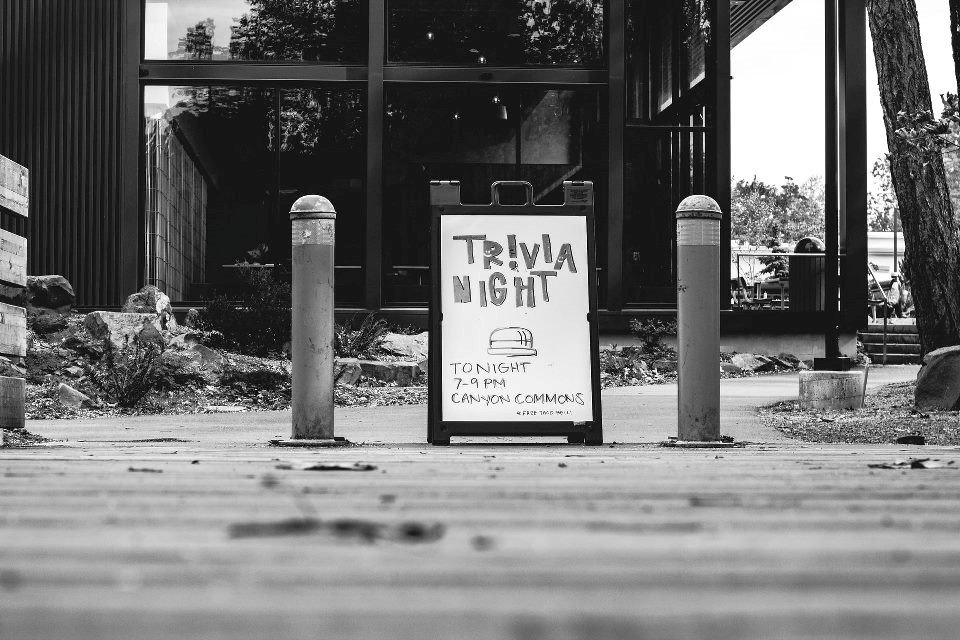
by Fern Shaw | Mar 9, 2021 | Water Coolers
We’ve given quite a bit of attention to British trivia over the years for good reason. Trivia is interesting, fun, it keeps your brain active and just as important, it provides you with a wealth of interesting knowledge you can impart to your colleagues, family and friends whenever you head off to replenish your drinking water at your water cooler station.
During the past year, we’ve seen the world turned on its head, the new ‘normal’ remaining ultimately unreal and strange compared to what we’re used to. So, in this rather topsy-turvy existence we thought it might be nice to impart a little brevity, as a way to alleviate the seriousness we’re all experiencing.
Geography
At 1,345 metres (4,413 ft.)the highest mountain in the UK is Ben Nevis, beating the next tallest, Ben Macdui, by around 100ft. ‘Ben Nevis’ is an Anglicisation of its actual Scottish Gaelic name: Beinn Nibheis.
The legal definition of a mountain is land over 600 metres (1,969 ft.). When Calf Top in Cumbria was re-surveyed in 2016 and confirmed to be 6 millimetres above the 609.6 m threshold for a 2,000 ft. peak, the Ordnance Survey described Calf Top as England’s ‘last mountain’.
Architecture
Completed in 2012, London’s The Shard, at 309.6 metres (1,016 feet), is the UKs tallest building.
The UK and Japan tie for the most winners of the international Pritzker Prize for Architecture over the last 25 years.
Science & Nature
Oxford born theoretical physicist Stephen Hawking wrote several children’s books with his daughter, Lucy, which feature a character ‘George’ – they combine science and adventure.
A blue whale can hold up to 5,000kgs of water in its mouth. As much as select of our range of water coolers have the capability to constantly supply refreshing drinking water to large organisations, we regret we’re not able to provide blue whale water coolers. Also … saltwater.
I think it’s safe to assume that here at AquAid, we like trivia. It may be as we understand the connection between cognitive function and how drinking water keeps one in tiptop trivia retaining knowledge mode – aside from being able to perform better throughout the working day of course – almost as important!
sources: Ben Nevis Calf Top The Shard Architecture Stephen Hawking Blue Whale
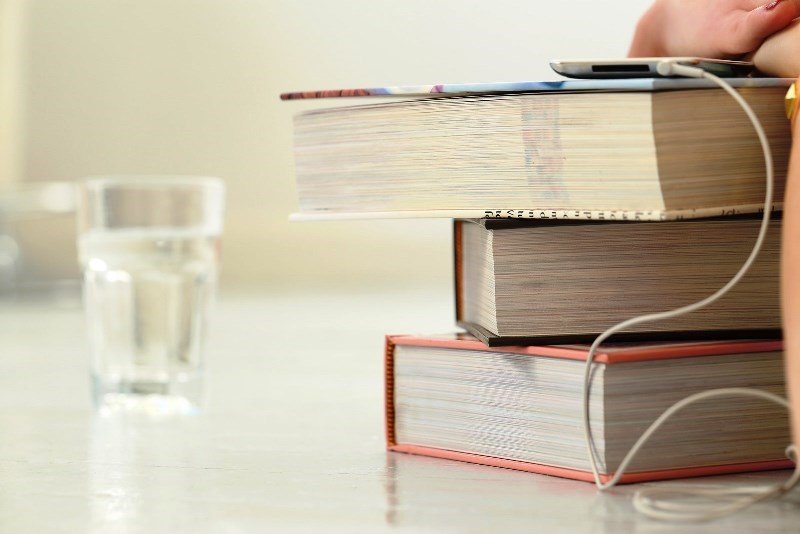
by Fern Shaw | Mar 3, 2021 | Water Coolers
With World Book Day on the horizon, we thought it prudent to look at the connection between good hydration habits and one’s ability to read better. And not only to read better, but how drinking a sufficient volume of water daily not only assists with the brain’s cognitive function, increasing our ability for better comprehension but also can be more conducive to reading purely for enjoyment and not just to overcome illiteracy. The idea of a person not being able to read or indeed not even considering reading for enjoyment is an anathema to those who consider reading one of life’s great pursuits. Sadly, not being able to read for millions of people, children and adults alike, is reality.
There have been numerous studies on cognitive function and hydration. In one study, researchers from the University of East London and the University of Westminster in the UK analysed the potential effects of water on cognitive performance and mood among 34 participants with an average age of 29 years.
The study published in the journal Frontiers in Human Neuroscience, involved participants taking part in a ‘water’ and a ‘no water’ experiment one week apart.
According to an article in Medical News Today, lead study author, Dr. Caroline Edmonds of the University Of East London School Of Psychology, said, “Our study found that reaction times were faster after people drank water, particularly if they were thirsty before drinking.”
The participants who drank around three cups of water (775 millilitres) just before completing the tests had a 14% increased reaction time compared with those who did not drink any water.
Here, at AquAid, we’re pleased that we’re able to do our part, in a number of ways: we supply water coolers to thousands of customers in the Education Sector, to colleges, schools, learning centres and universities. We understand how vital it is to have a consistent supply of refreshing drinking water, as maintaining good hydration habits enables students, of all ages, to function better, pay attention more easily and provides better comprehension overall.
This is why we value our customers and their support, which for more than 21 years, has helped us to be able to donate in excess of £17 million to charity. Charities like The Africa Trust and Christian Aid.
Both charities focus on breaking the cycle of poverty, increasing wealth creation and at the core, implementing safe water delivery projects to communities in clean water scarce regions, throughout Africa. These projects result in convenient access to potable and productive water. Water for children to drink, water to grow food, all which contribute towards more opportunities for the children to attend school, to learn, read and gain an education.
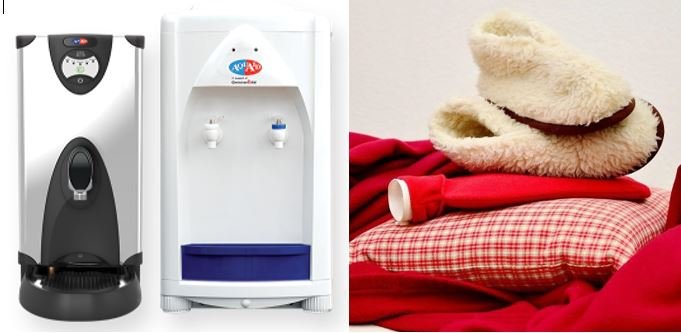
by Fern Shaw | Feb 21, 2021 | instant tap, Water Boilers, water cooler, Water Coolers
There are many items used to keep warm externally during when the weather is cold – something we blogged about previously. From furry pets (the best bed warmers), fuzzy socks, heavy coats to hot water bottles, options abound.
Of course, with the advent of the microwave, external body heaters mean we can avoid possible water spillage or leaking as well as negate the possibility of burns filling up a hot water bottle from the kettle. We now have heating pads available containing wheat, buckwheat or flax seed, which may sound like an alcohol brewing starter pack, but it isn’t.
As we’ve covered external body warming, we now look at hot water for warming yourself internally.
This leads us to introduce the AquAid range of water boilers. Each of these high quality, well-designed machines maintain your hot drinking water at an even temperature of 98 °C, thereby ensuring a constant supply of filtered, piping hot drinking water for all your warming hot drinks, combining both practicality and self-service all within a variety of stylish units.
For an alternate hot drinking water solution, we also supply AquAid Instant Taps. These elegant, convenient and environmentally friendly taps are space saving, compact and discreet, providing instantly ready and limitless boiling filtered water at the touch of a button.
Ideal for any workspace, office, remote work location, establishment, medical facility, university, college or school, AquAid Hot Water Boilers and Instant Taps are the perfect hot drinking water solution, meeting your requirements, all while saving you time, energy and money.
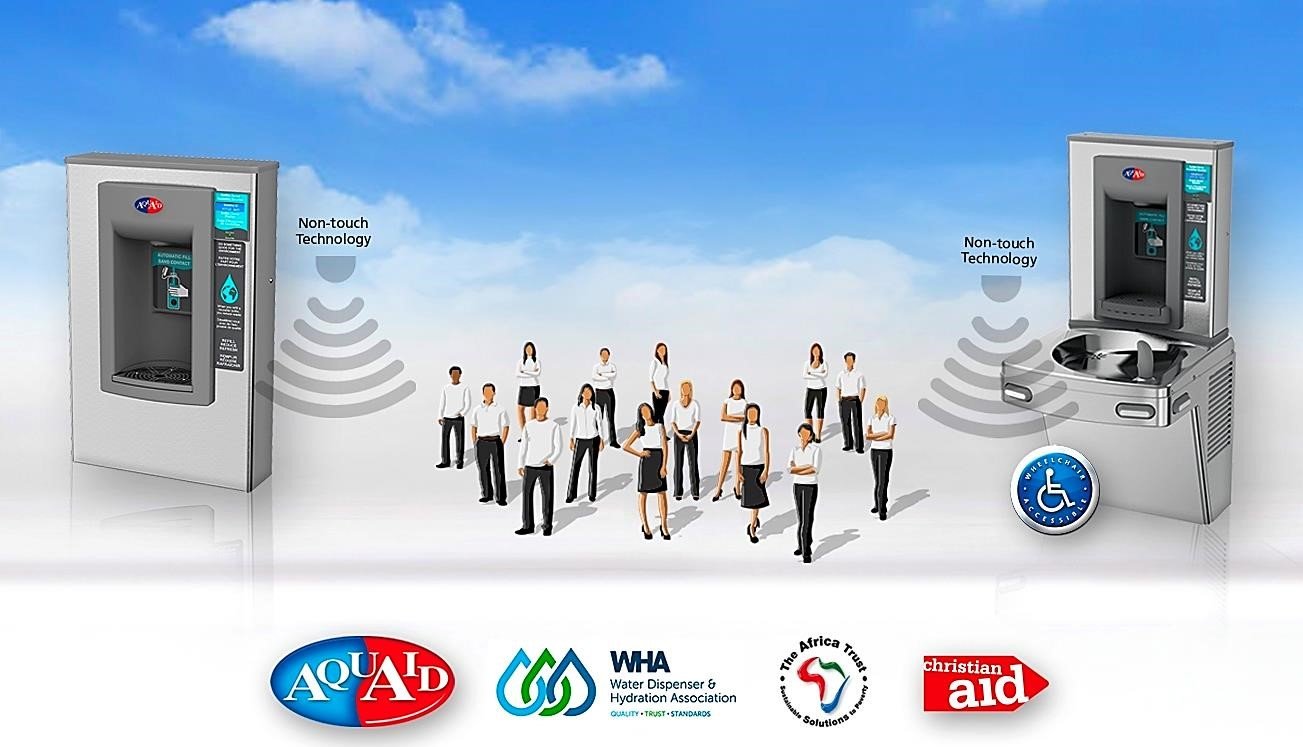
by Fern Shaw | Feb 15, 2021 | Water Boilers, Water Coolers, water dispenser
Many moons ago, I blogged about alternate drinking water receptacles in the event that you weren’t able to drink water directly from your water cooler.
Essentially, the blog detailed unusual drinking water receptacles. In retrospect, I realise that the title may have been a little misleading or, even worse, suggestive that your AquAid Water Cooler might not be able to deliver your refreshing drinking water (wholly untrue, of course!)
Fortunately, in the virtual world, we are quickly and easily able to rectify such incidences without wasting ink, paper or erasers. As we do here:
Allow me to introduce to you the AquAid range of Non-Contact Water Coolers, dispensing refreshing drinking water, safely and hygienically.
Each of these well-designed, innovative machines offers a host of operational safety-conscious features:
Like the infrared sensor technology on the AquAid Dual Ecofill Non-Touch water dispenser thus eliminating user contact with buttons. This high quality, durable design water dispenser also includes a smooth radius front for safety, wheelchair access and a non-contact dispense point, thereby minimising the risk of cross-contamination.
Alternatively, the stylish AquAid AQ Max Non-Touch water dispenser is perfect for installation in any workspace that requires constant access to refreshingly chilled drinking water. This well designed, no-touch Bottle Fed water cooler offers a host of user-friendly features that include a LED display, 175mm dispense gap, foot-operated non-touch technology, deep drip tray and an adjustable thermostat for accurate temperature control.
For those requiring the constant delivery of piping hot drinking water, one need look no further than AquAid’s range of Hot Water Boilers. We also offer an Optional Hygiene Adaptor for easy fitment on any of this range, ensuring a safe, no-contact supply of hot water whatever the scope of your requirements.
If you would like more information about which AquAid Touch Free Water Dispensers are the best fit for your premises, whether at home, in the workplace or at school, telephone: 0800 772 3003, e-mail: info@aquaidwatercoolers.co.uk or leave your details using the contact form on the AquAid website. We will be happy to assist.
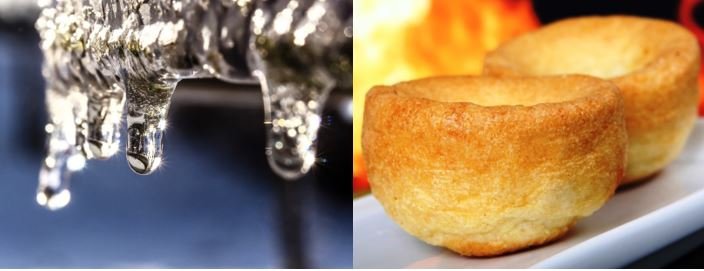
by Fern Shaw | Feb 8, 2021 | bottle fed water coolers, water cooler, Water Coolers
You may ask what the connection is, rightly so. It stems from family advice passed down through the generations – if you wanted your puds to rise and stay light and crispy during roasting in piping hot oil, ice-cold water was needed for the batter mixture. According to my Mum’s Nan, the best Yorkshire puds resulted from snapping off icicles and adding those to the batter.
It would seem that with the current weather we’re experiencing harvesting icicles for baking is a doddle. Now that we have that best baking tip sorted out, next we look at if it’s safe to use icicles or snow for your drinking water.
Generally speaking, it is safe to eat clean ice and snow during the winter in the wild outdoors. The same is not always true in urban areas where pollutants may be present. In the outdoors, pay attention to where you gather icicles. Gathering icicles from an evergreen tree in the countryside is one thing; snapping icicles from a roof edge another. If you hold an icicle up to the light and it looks clear and clean, it’s usually safe. However, there are other toxic reasons not to crunch on a snowball or lick an icicle.
Eating snow and icicles is tempting, especially when working up a sweat outside. However, you’ll want to consider where you find your seemingly delicious snow or ice. For instance, icicles formed on older homes may contain lead or other metals that are unsafe for consumption.
As we continue with self-isolation, working remotely or at a distance in the office or you if you have set up a home office, you may well ask if the chilled water from your AquAid water cooler is suitable for your food batters. It may be, however, although the cold water dispensed from your water cooler may be the perfect temperature, we would suggest that you reserve your water cooler water strictly for drinking. Especially if you are in a shared office. Whereas some of your colleagues (or family) may be delighted with your resourcefulness using chilled water from your water cooler in your baking efforts, others may not be.
Remember, for all your chilled, cool and hot water dispensers, whether Bottle-Fed or Mains-Fed; Hot Water Boilers; Hot and Cold Instant Taps as well as our range of Touch-Free Water Dispensers, speak to us at AquAid.
We remain operational and continue to take all precautions and necessary steps to reduce any risk to both staff and customers. Read our Covid-19 risk assessment.

by Fern Shaw | Jan 17, 2021 | instant tap, Water Boilers, Water Coolers, water dispenser
Maintaining good hydration habits may seem less important in winter than in summer, but this is not the case. I would venture that it is actually more important to make sure you’re drinking enough water in winter than in summer.
Dehydration is much less noticeable during winter, as you don’t notice how much you sweat under layers of clothing.
The dryness in the air may dehydrate our bodies quicker than we can imagine and most often, we don’t even feel thirsty, so our need for adequate water may remain unmet*. That’s why it’s important to work pre-emptively to replenish the fluid reserves of the body, in order to avoid any physical discomfort that will stem from dehydration in the future.
As with all seasons, winter also demands special dietary and lifestyle adjustments to prepare the body for the cold weather.
Drink room-temperature drinks: Although cold drinks are absorbed quicker, warmer or room temperature drinks keep your body temperature optimal – particularly ideal if you’ve been exercising in the cold.
Make good hydration a habit: Since your ability to recognise your thirst worsens as you age, today is the ideal time to start getting into the keeping hydrated habit.
Boosting Immunity: The cold and dry air may sap your body of energy, making you feel sluggish and even making you more susceptible to cold weather illnesses. Keeping hydrated helps boost immunity thereby protecting your body.
Regulating Weight: When you’re hydrated, your body is more capable of breaking down fats, effectively regulating body weight.
Eat water rich food: Fruit and veggies have a high water content – these add volume and keep you satisfied without the calories. Broth and soup are also a great way to consume water.
Water refresh: A lot of us just do not like drinking water, period. Try adopting a different approach. Switch up your room temperature water by adding lemon, cucumber or even ginger.
Helps skin health: Drinking adequate water during winter is essential to stay hydrated, all which helps to prevent dry and dull skin.
Whatever the weather and wherever your location in the UK, the easiest and quickest route to ensuring you have a constant supply of refreshing drinking water is to install a water dispenser from AquAid. We provide a wide range of high-quality water coolers, water boilers and Instant Taps.
AquAid has also recently added a selection of Touch-Free water coolers and water boilers to our range: providing you safe and easy access to your drinking water, thereby ensuring your continued hydration health.
*source: NDTV Food






